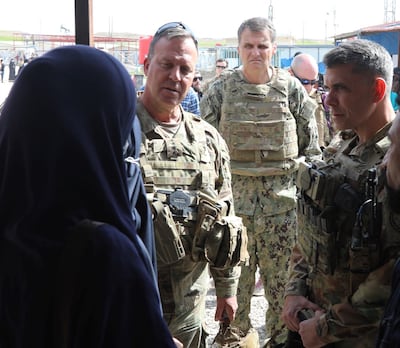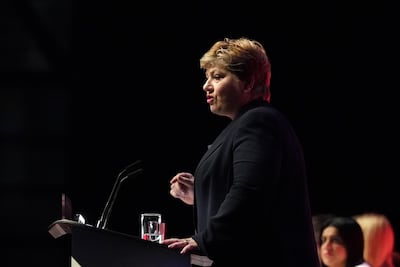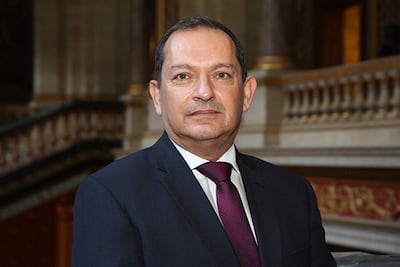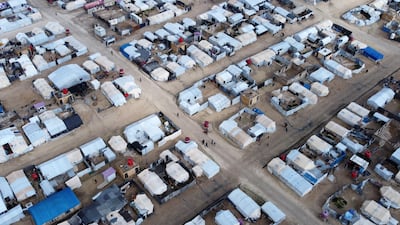The child of a British woman from north London held in an ISIS detention camp in Syria died amid a stand-off over the family's return to the UK.
The woman, who is said by her MP to be in declining health, is among an estimated 60 British nationals including women and children living in detention camps on the grounds that the adults were members of ISIS. The UK has refused to take the adults back, and has stripped the men and most of the women of their citizenship.

Dame Emily Thornberry, who chaired the Foreign Affairs Committee hearing, said she had been speaking to the family of one of her constituents, a mother of two who is in the camps in Syria with her one surviving child.
The woman, whom she did not name, had gone to Syria to marry an ISIS fighter when she was aged 17. Though the government had offered her a deal where her two children could be returned to the UK without her, she remains in the camp.
“One of (the children) has died, and she has one child left and is still trying to come back into the UK. My constituent was 17 when she was – some would say trafficked, some would not. She was a child and she went out to Syria to marry a fighter,” said Ms Thornberry, who served as shadow foreign secretary when the issue of detained foreign fighters first came to light.
Her health was visibly declining owing to the dire conditions in the camp. “There's been times when the family has seen videos of her and she's not been able to stand up,” she said.

It is not known why the women’s children did not leave the camp. Some mothers have refused to be separated from their children. In other instances, it was the Kurdish authorities who control the camps who rejected the proposal, fearing this would give no incentive for governments to bring back the women in the future.
“They didn’t want to be stuck with the mothers,” said Paul Jordan, head of responding to Security Crises at the European Institute of Peace, who has been involved in the repatriation negotiations.
Foreign Secretary David Lammy rejected calls from US President Donald Trump's team to repatriate detainees earlier this month. About 18 children with British parents, mainly orphans and unaccompanied minors, and three women have been allowed to return to the UK since 2019.
Mr Jordan said it would be possible to reintegrate children from the camps into the UK communities, owing to a “very sophisticated strategy” that the UK already had in place. This includes leveraging the Prevent programme locally.
Yet returning women and children had been offered little in terms of social support in the UK, said Prof Harmonie Toros of the University of Reading. “My understanding, they had hardly any support. They arrived at the airport and it was off you go. There has been very little in terms of structured support upon their return to the UK,” she told MPs.
Western governments fear the grounds for prosecuting returnees on their return would be too shaky. But Norway’s prosecution last week of two sisters who were repatriated from Al Roj with their children in 2023 after joining IS in their teens, could set a precedent, Prof Toros said.
The dire conditions in the camps, and their isolation had made them an “incredibly radicalising” place, Mr Jordan said.
UK government urged to 'do more' in Syria
Concerns over the fate of the families comes as the UK and other western governments are set to take key decisions on Syria since the fall of the Assad regime.
The UKs last Ambassador to Damascus urged the Labour government to take “bold” steps such as reopening the embassy and lifting sanctions on Syria.
Simon Collis, who was the UK’s Ambassador to Syria when the embassy closed in 2012, said the UK should be engaging with the new administration led by Ahmad Al Shara to ensure it forms an inclusive transitional government.
The country was in a “very fragile and dangerous phase” as it worked towards a transition, Mr Collis told MPs on Tuesday.
“The HTS leadership seems to be a small circle in Damascus. There's a bond there that's hard to break,” he said.
But western governments could use this period to influence the new administration at a time of rapid change. “There's nothing to lose from being bold,” he said, as he urged the UK government to be “doing more, more quickly”.
“Optimism is the actually the pragmatic response. There are clearly risks but there is nothing to be gained by the UK or other countries with any potential influence sitting back to wait and see,” he said.

The UK had a role to play in “nurturing” the new administration in achieving its stated goals, supporting transitional justice, as well as empowering civil society within Syria and bringing communities torn apart by war together, said Lina Khatib.
“We need to … nurture all these positive conversations happening about inclusion, because we can do a lot in that regard, and they need our help,” she said.
“Under Assad, Syria was a society in which people were encouraged to mistrust even members of their own family. Generation that have not known anything different, are now suddenly expected to just trust one another,” she said.
It could also draw from the expertise of Syrians overseas, who have spent years documenting war crimes and developing civil society initiatives in the hope that they could one day return.
“We're not starting from scratch. There have been people who have been documenting crimes by everyone, people who have used European courts to bring people from all sides to justice,” said Lina Khatib.
She also dismissed concerns that the new administration would seek to “reactivate” the disbanded Captagon trade that had been linked to members of the cash-strapped Assad regime.
Instead, members of HTS had been finding and exposing the warehouses where the highly addictive amphetamine was stored in areas formerly held by the Assad regime on social media.
“The new administration in Syria is very keen to have smooth relations with Saudi Arabia. The last thing they would want to do is reactivate a trade that Saudi Arabia was very concerned about,” she said.


